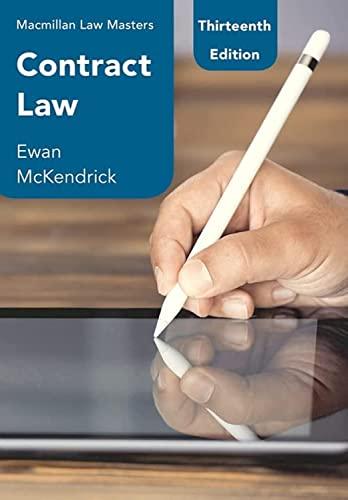Assignment
25. Where a contract has been substantially, but not completely performed, the innocent party: Doc. No.: EXM/F/03 Page No.: 4/2 Issue No.: 1 Last Update: 15/04/15 Revision No.: 1.1 Date: 12/04/06 Author: EC Approved: Provost a) is required to pay the full contractual amount. b) may refuse to pay any money owed until full completion has taken place. c) must pay 50% of the contractual fee and nothing more, regardless of the amount of work completed. d) is required to pay the amount due, taking into account the shortcomings of the contract and deducting an amount accordingly 26. In the event of a breach of contract, it is expected that the innocent party take which of the following action? a) To reasonably attempt to mitigate losses. b) To take any and all measures possible to reduce the associated losses to the breach. c) To establish a new contract with any alternative source available. d) To take no action until the full consequences of the breach are identified so a damages action can incorporate all sustained losses. 27. Which one of the following statements is correct? (a) A state has duty to become a party to every multilateral treaty (b) A state has a right to decide whether or not to become a party to a multilateral treaty and if it decides to become a party has a right to make reservation to limit its participation in any way it chooses (c) A state has a right to decide whether or not become a party to multilateral treaty and if it decides to become a party, it should accept the whole treaty (d) A state has a right to decide whether or not to become a party to multilateral treaty and if it decides to become a party, it may do so with or without reservations, provided that its reservations are compatible with the objects and purposes of the state. 28. In which of the following torts is the liability 'strict"? a) Negligence b) Pure economic loss c) Strict liability torts d) Obligation torts 29 Which one of the following statements is NOT correct? a) Customary rules of International Law are diminishing and are being replaced by law making treaties and conventions b) States do not deny the existence of International Law. On the contrary, they interpret International Law making so as to justify their conduct. c) A great limitation of International Law is that it cannot intervene in matters which are with in the domestic jurisdiction of states d) International Law is positive morality of state having no force. 30. Where customary International Law is comprised of rules identical to those of treaty law a) The treaty law overrides the customary law b) The customary law overrides the treaty law c) The rules of customary law become jus cogens d) Both the treaty law and the customary law co-exist. 31. What is required for a general rule of customary law to be formed? Doc. No.: EXM/F/03 Page No.: 5/2 Issue No.: 1 Last Update: 15/04/15 Revision No.: 1.1 Date: 12/04/06 Author: EC Approved: Provost a) Only general, widespread and consistent practice on the part of States is required. b) The consistent practice of few States is sufficient. c) The legal conviction that a certain practice of a State is in accordance with international law is the most significant requirement. d) Both the elements of widespread and consistent State practice and of the opinio juris are required. 32. What kind of passage does qualify as 'innocent passage"







